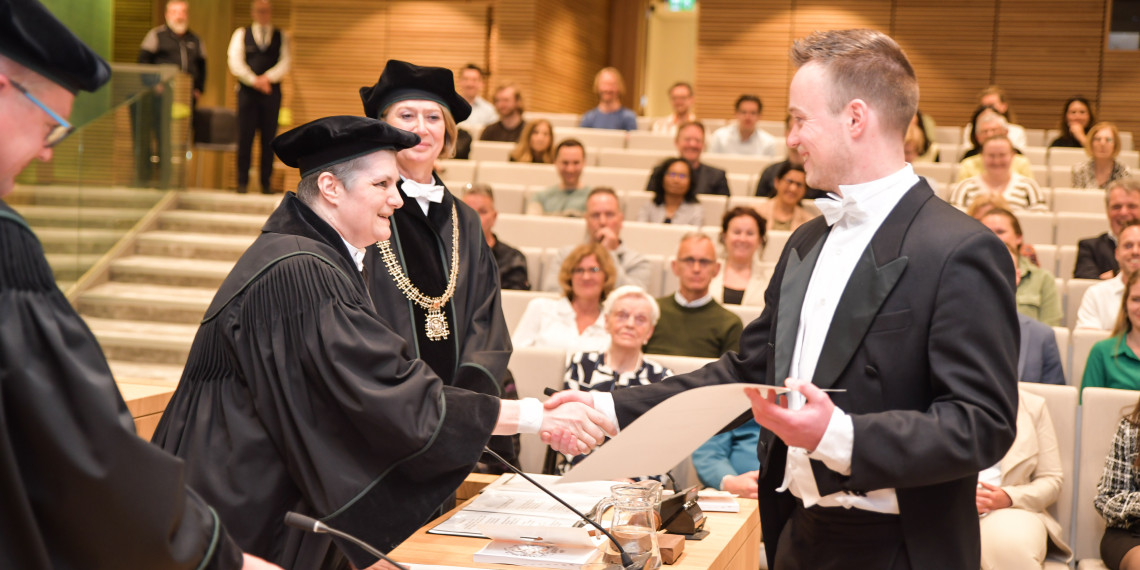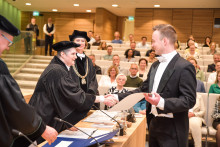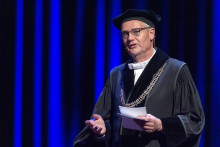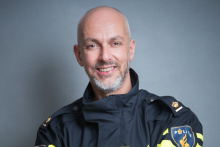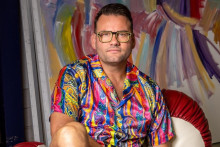He remembers it exactly. How he felt slightly nervous that morning of 3 May 2024, busy putting on his suit for his defence later that day. His phone rang. There was actually no time to take the call, but the secretary of his department said it was really urgent. ‘While I was putting on my shoes, I entered a video call with her and a colleague. Paul Havinga, my supervisor and mentor since day one, had died that morning.’
Bemthuis pauses for a moment when he thinks back. ‘I froze and didn’t know what to say. I had spoken to him a week earlier. His death came as a huge shock because Paul was always so positive and hopeful about the future. Many, including myself, didn’t know he was already so ill.’
The PhD candidate then had to make an important decision in that bizarre moment: was he going to continue with his defence, or not? At first, he wanted to cancel everything – after all, how important is a PhD defence under such circumstances? But his colleagues and his girlfriend asked him: What would Paul have said if you cancelled this now? ‘His answer would undoubtedly have been: Rob, what are you doing to me? He would have thought it unwise. The date of my defence had already been postponed several times. It was time to wrap up.’
On autopilot
And so it happened – although it was still questionable whether his defence was legally valid. There was something else at play. Bemthuis’ other supervisor, Maria Iacob, had a medical appointment in Amsterdam at the time. She had advanced-stage cancer and could not be present at the defence because of that appointment. But according to the statutes, a minimum number of committee members with promotion rights must be present.
‘I remember her that day as very strong and had a lot of admiration for her’
Bemthuis: ‘A lot of people put in a tremendous effort to make it legally possible for me to acquire my doctoral title. I felt the support of colleagues, family, friends, and the committee enormously.’ His defence then went on autopilot. Only during the so-called layman’s talk did he become visibly emotional, after showing an image of committee member Paul Havinga.
Then, suddenly, he saw promotor Maria appear from the corner of his eye – via a video connection. She was on her way to Enschede.

Strong as iron
It touched Bemthuis enormously that she was willing to do that for him. ‘In the end, she was able to physically attend the final part of the ceremony. She delivered the laudation, followed by a personal message. That was pure improvisation, on the spot, while she was still recovering from cancer treatments and had just wrapped up a very intensive day. I remember her that day as very strong and admired her so much. What strength she must have had to want to appear at my PhD defence – that she was willing to do this for me in her miserable state.’
Maria died on 7 October 2024 – almost a year ago now. Bemthuis deliberately waited a long time to tell his story. Out of respect for her relatives, and to keep the attention on both Paul and Maria. He knows that the grief and loss for family and friends is so much more intense. What he does want is to tell this story as a kind of tribute to two very special and resilient academics.
Obtaining a PhD, for him, was not only an academic achievement, but also ‘a personal journey together with your supervisors’. ‘In my case, that journey was tough, but at the same time insightful and inspiring. Paul and Maria were constantly by my side during the PhD process. I learned special life lessons from them as a result.’
Drinking beer
For example, the former PhD student experienced quite a tough collaboration with Paul. ‘During my interim qualifier interview, he and I clashed heavily about the content of my research. We had hours of fierce discussions. But that confrontation was very valuable to me; it forced me to think more sharply and also improved my research to such an extent that it even earned me a Best Paper Award later on. Perhaps the best thing was that we could have a beer together again immediately after the discussion.’ He summarises: ‘Paul taught me that you can have robust professional debates with respect and without resentment — so that the best ideas come to the surface.’
‘Paul always had a listening ear’
But there is more. Bemthuis got to know Paul not only as a brilliant researcher, but also as a warm human being. ‘Well before his death, we went with the whole department on our bikes to his house in Saasveld. Paul and his wife were very welcoming and did everything to make us feel at home. I will never forget that visit. It reminds me that behind titles and functions there is always a human being of flesh and blood.’
According to Bemthuis, his supervisor always had time for a sincere how are you?
‘Thanks to Paul, I realise how important it is to keep an eye on each other as people in academia. That bond of human involvement not only makes working together more pleasant, but also more productive – because trust and understanding grow.’

True dedication
Maria-Eugenia Iacob was Bemthuis’ second supervisor and daily supervisor. In practice, this meant they spoke weekly. He saw her as a mentor ‘with a big heart – astute in her feedback, and warm when the situation called for it.’ She was also very open about her cancer diagnosis, says Bemthuis. And despite her illness, she showed enormous dedication and resilience.
‘Even when she got seriously ill, she continued to put her heart and soul into her students and colleagues. That became apparent when she showed up at my PhD defence straight from Amsterdam. I know that must have cost her a lot of energy.’ Now that he thinks back on it, he realises: Maria made him understand that true devotion doesn’t give way to adversity.
‘A good mentor never dies completely. A piece of them always survive’
One of the most valuable lessons he learned from her is that the impact of a supervisor lives on in their students. ‘Maria supervised and inspired many students and PhD candidates in the eighteen years she was affiliated with the UT. She taught them something – that is her true legacy. I feel that more strongly now than ever. And everything she taught us, we pass on to the next generation. I find that realisation hopeful: a good mentor never dies completely. A piece of them always survive.’
Highs and Lows
He obtained his doctorate over a year ago now. His PhD trajectory had highs and lows. He sees the legacy that his supervisors left behind as a precious gift. ‘The bond between PhD candidate and supervisor may be difficult for outsiders to fathom, but for me it was invaluable. Paul and Maria not only shaped me as a scientist, but also as a person. I will pass on their lessons about resilience, humanity, ambition, and dedication wherever possible. Ultimately, it is the human connections and shared lessons that make a PhD a life experience – one with an impact that extends far beyond that single ceremony.’



